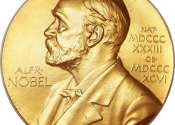Three win Nobel Prize for showing how cells sense low oxygen
Two Americans and a British scientist won a Nobel Prize on Monday for discovering details of how the body's cells sense and react to low oxygen levels, providing a foothold for developing new treatments for anemia, cancer ...









